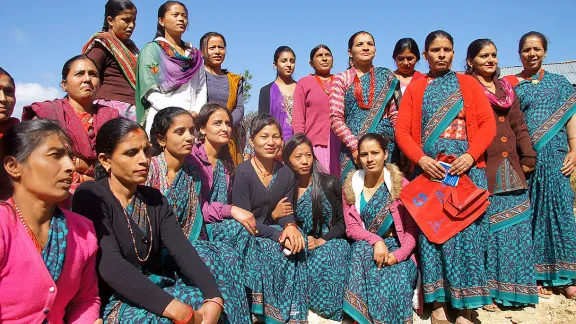
A cooperative of Dalit women in Nepal. LWF is working with marginalized communities to help them claim their rights. Photo: LWF/C. Kästner
LWF Submits Parallel Reports to Human Rights Council
(LWI) - Safeguarding human rights of disadvantaged groups in Myanmar and Nepal is a prime concern of The Lutheran World Federation (LWF). Therefore, the LWF has submitted two reports on the Human Rights Situation in Nepal and Myanmar to the UN Human Rights Council (HRC) for the so-called Universal Periodical Review (UPR) of those two countries. The reports are based on consultations LWF staff did with rights-holders and civil society organizations they work with in those countries.
“In general, the rights-holders in communities within which we work are not able to access their fundamental rights that are needed for their survival, such as right to land and right to water,” the Myanmar report states. For Nepal, the report recommends more actions to safeguard the participation of women, children, the elderly and people with disabilities. “In Nepal, Dalit, persons with disabilities, former bonded laborers, indigenous peoples and Muslims continue to live on the margins of society,” the summary reads.
The reports contribute to the Universal Periodic Review (UPR) process, a unique mechanism of the United Nations Human Rights Council (HRC) aimed at improving the human rights situation on the ground of each of the 193 United Nations Member States. Under this mechanism, the human rights situation of all UN Member States is reviewed every 4.5 years. As part of the process, non-governmental organizations are invited to submit firsthand reports, so-called parallel reports. The member states can take these findings into consideration when they present their list of recommendations to the country under review.
Consultations with Local Communities
The Lutheran World Federation (LWF) has been invited to submit these parallel reports for the UPR of Nepal and Myanmar. The reports were assembled by LWF country programs during a 3-month consultation process with communities and civil society actors in the respective countries. “The country programs have both spoken to a range of community members, local community-based organizations and authorities to put together these reports,” LWF Advocacy Officer Ojot Ojulu says.
The reports submitted by the LWF focus on land rights, non-discrimination, and the right to education, health, housing, water and food. The report on Myanmar also mentioned the lack of identity papers and registration of births as a major human rights concern. Without legal identity, people are not able to exercise their most basic civil rights and are denied services such as education and health care.
“We encourage civil society actors to use these reports and discuss the recommendations with their respective governments and authorities in the light of the upcoming UPR reviews for both these countries,” Ojulu says.
Long-Standing Commitment
LWF Myanmar is a country program of the LWF Department for World Service. Since 2009 it has been working with marginalized and disadvantaged communities in the areas of emergency preparedness and response, creating sustainable livelihoods, food security, water, sanitation and hygiene, disaster risk reduction and human rights.
In Nepal, the LWF country program has been working for over 30 years in the areas of refugee assistance, disaster risk reduction, emergency preparedness and response, sustainable livelihoods and community-led actions for governance and justice. LWF in Nepal has been advocating for the rights of Tibetan and Bhutanese refugees, (former) bonded laborers and members of the lowest Hindu caste, the Dalit.
The UPR for Myanmar and Nepal will take place during the 23rd session of the UPR Working Group in November 2015.


